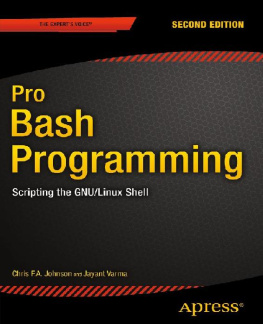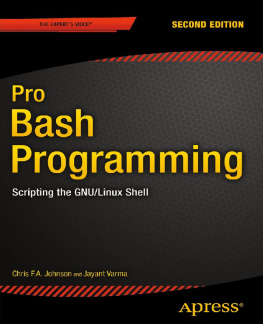Mastering Bash
Automate daily tasks with Bash
Giorgio Zarrelli
BIRMINGHAM - MUMBAI
< html PUBLIC "-//W3C//DTD HTML 4.0 Transitional//EN" "http://www.w3.org/TR/REC-html40/loose.dtd">
Mastering Bash
Copyright 2017 Packt Publishing
All rights reserved. No part of this book may be reproduced, stored in a retrieval system, or transmitted in any form or by any means, without the prior written permission of the publisher, except in the case of brief quotations embedded in critical articles or reviews.
Every effort has been made in the preparation of this book to ensure the accuracy of the information presented. However, the information contained in this book is sold without warranty, either express or implied. Neither the author, nor Packt Publishing, and its dealers and distributors will be held liable for any damages caused or alleged to be caused directly or indirectly by this book.
Packt Publishing has endeavored to provide trademark information about all of the companies and products mentioned in this book by the appropriate use of capitals. However, Packt Publishing cannot guarantee the accuracy of this information.
First published: June 2017
Production reference: 1190617
Published by Packt Publishing Ltd.
Livery Place
35 Livery Street
Birmingham
B3 2PB, UK.
ISBN 978-1-78439-687-9
www.packtpub.com
Credits
Author Giorgio Zarrelli | Copy Editors Dipti Mankame Yesha Gangani |
Reviewer Sebastian F. Colomar | Project Coordinator Judie Jose |
Commissioning Editor Kartikey Pandey | Proofreader Safis Editing |
Acquisition Editor Rahul Nair | Indexer Rekha Nair |
Content Development Editor Abhishek Jadhav | Graphics Kirk D'Penha |
Technical Editor Aditya Khadye | Production Coordinator Melwyn Dsa |
About the Author
Giorgio Zarrelli is a passionate GNU/Linux system administrator and Debian user, but has worked over the years with Windows, Mac, and OpenBSD, writing scripts, programming, installing and configuring services--whatever is required from an IT guy. He started tinkering seriously with servers back in his university days, when he took part in the Computational Philosophy Laboratory and was introduced to the Prolog language. As a young guy, he had fun being paid for playing games and write about them in video game magazines. Then he grew up and worked as an IT journalist and Nagios architect, and recently moved over to the threat intelligence field, where a lot of interesting stuff is happening nowadays.
Over the years, he has worked for start-ups and well-established companies, among them In3 incubator and Onebip as a database and systems administrator, IBM as QRadar support, and Anomali as CSO, trying to find the best ways to help companies make the best out of IT.
Giorgio has written several books in Italian on different topics related to IT, from Windows security to Linux system administration, covering MySQL DB administration and Bash scripting.
At last, some acknowledgments since we cannot do much without the help of the people who make our lives better. Firstly, Ilaria, who had to go through all the weekends and the mornings I spent writing instead of strolling downtown. Then, mum and dad and my brother, Maurizio. Being Italian, my mum would kill me if I did not acknowledge her--and, by the way, they are such an important part of my life. Lets keep it short, since I cannot thank all the people who enrich my life and have put some flourishes into this book. So let me thank my bosses at Anomali, Gabe and Mitul, for supporting me and letting me use a Mac (I do whatever needed to write a book, even if it is crazy) when my laptop broke and the replacement was stuck somewhere around the globe. Thanks to my editor, Abhishek, for being supportive, professional, and patient during the writing of this book. Finally, thank you, dear reader, for having a look at this book--sometimes IT can be boring; I've tried to make it fun.
About the Reviewer
Sebastian F. Colomar is a GNU/Linux system engineer specializing in the scripting, installation, configuration, and maintenance of Linux servers for better security and performance.
He is currently an infrastructure architect at Hanscan, having been a consultant for scripting and Linux administration for many companies, such as IBM, Indra, Thales, Accelya, Accenture, AXA, Cetelem, RTVCM, EMT, and ESA.
www.PacktPub.com
For support files and downloads related to your book, please visit www.PacktPub.com .
Did you know that Packt offers eBook versions of every book published, with PDF and ePub files available? You can upgrade to the eBook version at www.PacktPub.com and as a print book customer, you are entitled to a discount on the eBook copy. Get in touch with us at service@packtpub.com for more details.
At www.PacktPub.com , you can also read a collection of free technical articles, sign up for a range of free newsletters and receive exclusive discounts and offers on Packt books and eBooks.

https://www.packtpub.com/mapt
Get the most in-demand software skills with Mapt. Mapt gives you full access to all Packt books and video courses, as well as industry-leading tools to help you plan your personal development and advance your career.
Why subscribe?
- Fully searchable across every book published by Packt
- Copy and paste, print, and bookmark content
- On demand and accessible via a web browser
Customer Feedback
Thanks for purchasing this Packt book. At Packt, quality is at the heart of our editorial process. To help us improve, please leave us an honest review on this book's Amazon page at https://www.amazon.com/dp/1784396877.
If you'd like to join our team of regular reviewers, you can e-mail us at customerreviews@packtpub.com. We award our regular reviewers with free eBooks and videos in exchange for their valuable feedback. Help us be relentless in improving our products!
Table of Contents
Preface
Bash is a common tool for everyday tasks that almost every Linux user relies on. Whatever you want to do, you have to log in to a shell, and most of the time, it will be Bash. This book aims to explain how to use this tool to get the most out of it, whether it be programming a plugin or network client or simply explaining why a double dot means what it means, we will dig a bit deeper than usual to become fully confident with our shell. Starting from the basics but with a different point of view, we will climb up step by step, focusing on the programming side of our environment, looking at how to prevent any issues in setting up our recurring tasks and ensure that everything works fine. Make it once, take your time, debug, improve, and then fire and forget; as in old Linux saying states, "If it works, why change it?" So, since we are dealing with sayings, we could stick to the other two cornerstones: "KISS: Keep it simple, stupid" and "Do only one thing, but do it well." These are three principles around which Linux revolves: making something, not everything, and making it simple and reliable and taking your time to make it work well so you do not have to modify it too often over time. When something is focused and simple, it is easy to understand, well maintained, and safe. And that is our approach, since Bash is not only a tool but also the environment we spend a lot of time in, and so understanding it, making the best use of it, and keeping everything clean and tidy should be our daily aim.

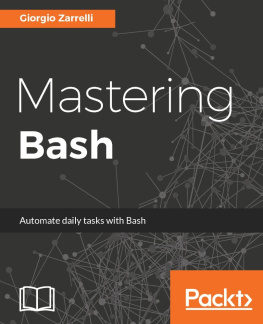
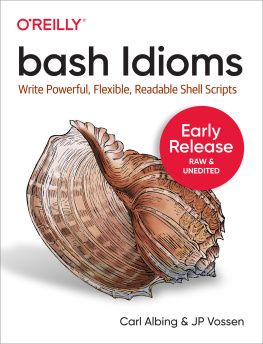

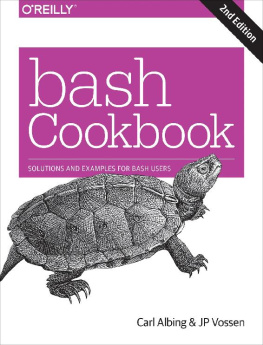
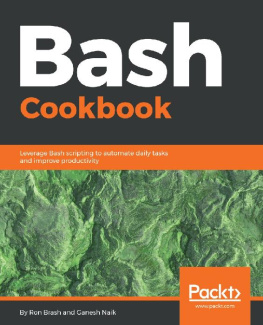
![Chris F.A. Johnson [Chris F.A. Johnson] - Pro Bash Programming: Scripting the GNU/Linux Shell](/uploads/posts/book/119669/thumbs/chris-f-a-johnson-chris-f-a-johnson-pro-bash.jpg)
